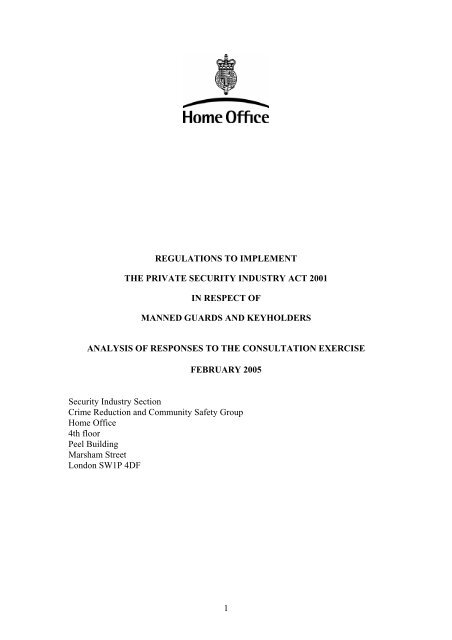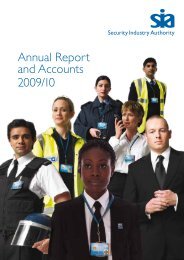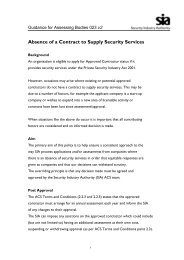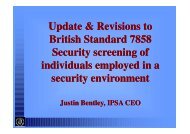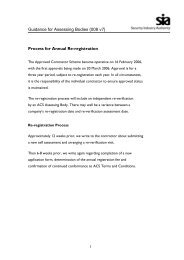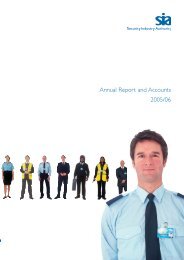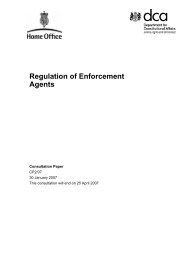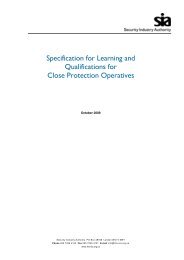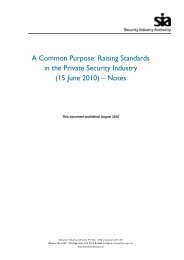Regulatory Impact Assessment for Manned Guards & Keyholders
Regulatory Impact Assessment for Manned Guards & Keyholders
Regulatory Impact Assessment for Manned Guards & Keyholders
Create successful ePaper yourself
Turn your PDF publications into a flip-book with our unique Google optimized e-Paper software.
REGULATIONS TO IMPLEMENT<br />
THE PRIVATE SECURITY INDUSTRY ACT 2001<br />
IN RESPECT OF<br />
MANNED GUARDS AND KEYHOLDERS<br />
ANALYSIS OF RESPONSES TO THE CONSULTATION EXERCISE<br />
FEBRUARY 2005<br />
Security Industry Section<br />
Crime Reduction and Community Safety Group<br />
Home Office<br />
4th floor<br />
Peel Building<br />
Marsham Street<br />
London SW1P 4DF<br />
1
CONTENTS<br />
Part Subject Page<br />
1 Introduction 2<br />
2 Executive Summary 3<br />
3 List of the suggested questions <strong>for</strong> response 4<br />
4 Summary of responses 5<br />
4.1 Views on cost versus benefit 5<br />
4.2 Training <strong>for</strong> security guards 6<br />
4.3 The keyholder sector 7<br />
4.4 The effect of regulation on business 8<br />
4.5 Burden on business 9<br />
4.6 Criminality criteria options 10<br />
4.7 Licence implementation schedule 11<br />
4.8 En<strong>for</strong>cement and sanctions 12<br />
4.9 <strong>Impact</strong> on ethnic minorities 13<br />
4.10 Competition issues 14<br />
4.11 The balance of regulations 15<br />
4.12 Public protection 16<br />
4.13 Other observations 17<br />
ANNEXES<br />
Annex A Comments from key respondents 18<br />
Annex B Respondents to the consultation document 21<br />
2
1. Introduction<br />
1.1 On 29 November 2004, the Home Office (HO) published a partial regulatory<br />
impact assessment consultation paper seeking views on further proposals to<br />
regulate the private security industry. In particular, the paper sought comments<br />
on the proposed criteria <strong>for</strong> the granting of licences <strong>for</strong> manned guards and<br />
keyholders. For the purposes of the paper, ‘manned guarding’ includes<br />
numerous job activities: security guarding; cash and valuables in transit; close<br />
protection; and close circuit television <strong>for</strong> public surveillance.<br />
1.2 The partial regulatory impact assessment consultation document was sent out<br />
to over 8,000 interested individuals and organisations which included private<br />
security providers/suppliers and purchasers, trade bodies, local authorities, the<br />
police, training providers, and everyone who had been in correspondence with<br />
the Home Office regarding manned guards and keyholders. The consultation<br />
document was also made available <strong>for</strong> download from the HO, Security<br />
Industry Authority (SIA) and British Security Industry Association (BSIA)<br />
websites.<br />
1.3 During the 8 week consultation period, a combined total of 13,480 opened the<br />
document from the SIA and HO website. The Home Office also received<br />
individual requests <strong>for</strong> copies of the consultation document close to the<br />
deadline date <strong>for</strong> responses. These recipients were allowed some extra time<br />
beyond the deadline date to respond.<br />
1.4 Both the SIA and the HO sent out electronic and postal reminders to all the<br />
interested parties of the consultation paper in order to encourage all those who<br />
wished to reply to the partial regulatory impact assessment to submit their<br />
feedback within the deadline date. A reminder of the deadline date <strong>for</strong><br />
responses was also posted on the British Security Industry Association<br />
website.<br />
1.5 Un<strong>for</strong>tunately, only 49 <strong>for</strong>mal replies were received in total. Given the<br />
substantial difference in the number of people who saw the consultation<br />
document and those who provided responses, it has been assumed that many<br />
people chose not to reply to the consultation paper as they did not have any<br />
major concerns. A full list of the respondents to the consultation document can<br />
be found in the annex, excluding the 5 respondents who requested that their<br />
comments remain confidential.<br />
1.6 Although 49 responses is a relatively small figure on which to analyse<br />
responses to the consultation document, many different thoughts were offered.<br />
As such, it is not possible to describe all those responses in detail. The<br />
objective is to reflect the major views that emerged, following the template of<br />
the suggested questions that were set out in the consultation document.<br />
2. Executive Summary<br />
3
.10 All respondents to the consultation paper accepted the importance of training<br />
<strong>for</strong> security guards, as a means by which standards across the whole of the<br />
industry could be improved. Of those who had concerns regarding the<br />
proposed training requirements, most respondents wanted a more inclusive<br />
training programme and some wanted greater recognition <strong>for</strong> training already<br />
undertaken.<br />
2.2 An overwhelming 90% of respondents to the question gave their support <strong>for</strong><br />
the application of criminality criteria. Respondents were keen to get rid of the<br />
criminal element within the security industry and in turn improve the image of<br />
the industry.<br />
.10 The majority of people supported the proposals regarding en<strong>for</strong>cement and<br />
sanctions. They believed that rigorous en<strong>for</strong>cement of the regulations and the<br />
application of sanctions would build confidence in the industry and would<br />
enable the SIA to fulfil the aims of the regulations.<br />
.11 The most prominent concern which arose from the responses to the<br />
consultation document was that of cost; training and licensing costs <strong>for</strong> the<br />
individual applicant and <strong>for</strong> supplier companies. However many people<br />
acknowledged that licensing is necessary <strong>for</strong> the industry and as such the costs<br />
should be viewed as an investment.<br />
.12 Although respondents recognised the advantages of licensing the security<br />
industry, many were concerned about meeting the regulations by the<br />
compliance date. Some people put <strong>for</strong>ward the view that a longer and more<br />
flexible transition period was required in order to ease concerns about<br />
prosecution.<br />
.13 The majority of respondents believed that depending on whether the most fair<br />
and realistic criminality criteria are chosen, the effective implementation of<br />
licensing would go a long way to improve the standards of the security<br />
industry.<br />
3. List of the suggested questions <strong>for</strong> response<br />
4
1) Cost versus benefits – what are your viewpoints?<br />
2) What are your views about the Training <strong>for</strong> Security <strong>Guards</strong>?<br />
3) What are your thoughts about the Keyholder sector?<br />
4) If you manage/supervise a business, what effects do you think this regulation<br />
will have on it?<br />
5) Do the regulations place any unnecessary burdens on business?<br />
6) What are your opinions on the criminality criteria options?<br />
7) What are your views on the licence implementation schedule?<br />
8) What are your thoughts about the en<strong>for</strong>cement and sanctions?<br />
9) Do you think the regulations will impact negatively on ethnic minorities?<br />
10) Do you have any concerns over the competition issues identified within the<br />
assessment?<br />
11) Do the regulations strike the right balance?<br />
12) Do the regulations adequately protect the public?<br />
13) Are there any other observations you would like to express?<br />
4. Summary of responses<br />
5
4.1 Views on cost versus benefit<br />
Respondents<br />
did not specify<br />
39%<br />
Diagram 1. Cost verses benefit<br />
Unsure 23%<br />
Costs<br />
outweigh<br />
benefits 20%<br />
Benefits<br />
outweigh costs<br />
18%<br />
• 40 out of 49 respondents (82%) provided their views on the costs and benefits<br />
of the regulations in respect of manned guards and keyholders.<br />
Diagram 1<br />
• 20% of respondents felt that the costs would outweigh the benefits.<br />
• 18% of people believed that the benefits would outweigh the costs.<br />
• 23% of people felt unsure and suggested they were unable to make an accurate<br />
cost versus benefit analysis at this stage as the benefits are long-term and<br />
difficult to specify.<br />
• 39% of respondents did not specify whether they thought the costs would<br />
outweigh the benefits, or vice versa.<br />
4.1.1 Cost of the SIA licence<br />
Of the total people who commented on this issue, 30% of people expressed<br />
concerns regarding the cost of the licence application <strong>for</strong> the individual<br />
applicant and also <strong>for</strong> supplier companies that chose to pay on behalf of their<br />
staff. These respondents highlighted that the costs included a substantial oneoff<br />
cost <strong>for</strong> individual applicants which would be particularly burdensome <strong>for</strong><br />
existing security staff on low wages, and claims they would involve huge<br />
administration costs <strong>for</strong> supplier companies who managed the licence<br />
applications <strong>for</strong> their employees.<br />
4.1.2 Transfer of cost to purchaser<br />
In addition, 23% of people suggested that transferring some of the costs to the<br />
purchaser of security services would be difficult as the higher cost to the<br />
purchaser would appear much earlier than they saw any clear benefits. As an<br />
industry heavily focused on costs, some respondents feared that purchasers<br />
would seek contracts with other supplier companies, develop in-house<br />
security, or manage without.<br />
6
.10.1 Benefits outweigh costs<br />
18% of respondents gave unequivocally positive comments, believing that the<br />
industry as a whole would benefit from a more stable work<strong>for</strong>ce, highly<br />
skilled individuals, and that in the long-term reputable firms would be able to<br />
recoup the initial costs of licensing.<br />
4.2 Training <strong>for</strong> security guards<br />
Diagram 2. Training <strong>for</strong> security guards<br />
Negative<br />
Some<br />
concerns<br />
Positive<br />
0 2 4 6 8 10 12 14 16<br />
• 41 out of 49 people (84%) provided a response to the issue of training <strong>for</strong><br />
security officers.<br />
• Of the 41 respondents, 15 people (37%) gave a generally positive response.<br />
• 12 people (29%) offered negative comments.<br />
• 14 people (34%) expressed some concerns regarding the proposed training<br />
requirements <strong>for</strong> security guards.<br />
• All accepted the importance of training <strong>for</strong> security guards.<br />
4.2.1 Of those who made positive comments regarding the mandatory training <strong>for</strong><br />
security guards, most respondents expressed support <strong>for</strong> training as they felt<br />
that it would benefit the security industry by uni<strong>for</strong>mly increasing the skill<br />
levels of security guards, thus enhancing confidence in the industry.<br />
4.2.2 The respondents who made negative observations did so because they felt that<br />
the training requirements were too basic and deficient in aspects such as<br />
search techniques, first aid, fire safety, and continuation training. Many of<br />
these respondents also made the case <strong>for</strong> the need <strong>for</strong> those with a door<br />
supervisor licence to complete conversion training in order to be allowed to<br />
work as a manned guard.<br />
7
4.2.3 Of those who expressed concerns over the training proposal <strong>for</strong> security<br />
guards, 57% of people suggested that it was of no significant value <strong>for</strong><br />
existing security officers and that there should instead be a greater recognition<br />
of current training courses that comply with British Standards. One respondent<br />
made a specific appeal <strong>for</strong> ‘grandfather rights’ to be applied <strong>for</strong> security<br />
guards.<br />
4.3 The keyholder sector<br />
• 22 people (45%) offered their views on the keyholder sector.<br />
• 64% of respondents expressed support <strong>for</strong> the regulation of the keyholder<br />
sector as they felt that it was a very important area of the security industry,<br />
requiring the highest level of responsibility.<br />
• 36% of people stated that there was no need to develop a separate keyholder<br />
licence as it could simply be incorporated into the manned guard licence,<br />
owing to the two sectors being interconnected and in an ef<strong>for</strong>t to prevent<br />
further costs <strong>for</strong> the industry.<br />
4.3.1 2 people suggested that a separate training course ought to be established <strong>for</strong><br />
keyholders as a supplement to the standard training <strong>for</strong> security guards.<br />
4.3.2 2 people put <strong>for</strong>ward the view that a clearer definition was required in order to<br />
detail the licensable activities of a keyholder.<br />
4.3.3 1 respondent said that they were awaiting further proposals from the SIA<br />
regarding the keyholder sector.<br />
4.4 The effect of regulation on business<br />
8
Both negative<br />
and positive<br />
45%<br />
Diagram 3. Effect of regulation on business<br />
Unsure 7%<br />
Positive 11%<br />
Negative 37%<br />
• 27 out of 49 people (55%) submitted a response to this question.<br />
• 37% of people held the view that the regulations were likely to have a wholly<br />
negative impact on business.<br />
• 11% of respondents only noted the positive effects that regulation is expected<br />
to have on business.<br />
• 45% of people observed both positive and negative effects on business that<br />
may result from regulation.<br />
• 7% of people were unsure of what the effect of regulation on business might<br />
be.<br />
4.4.1 Of those who expressed the view that the regulations would have an altogether<br />
negative impact on business, the majority identified the following as the<br />
probable results of regulation:<br />
staff shortages;<br />
the move of purchasers to develop their own in-house security;<br />
reduced competition as some supplier companies went out of business; and<br />
the general decline in business.<br />
4.4.2 The respondents who felt that the regulations would only have positive effects<br />
on business associated regulation with:<br />
a more professional industry that could prove its competence;<br />
the ability to deliver a better service;<br />
better pay <strong>for</strong> security guards; and<br />
hopefully bigger profit margins <strong>for</strong> supplier companies.<br />
4.4.3 The 45% who noted both the positive and negative effects of regulation<br />
acknowledged the short-term costs and administrative burden of the licensing<br />
process, but also recognised the obvious gains to be had from a well-regulated<br />
industry.<br />
9
4.4.4 56% of the total respondents to this question had specific concerns regarding<br />
the increased costs with which supplier companies would be burdened with,<br />
such as:<br />
the cost of training and the licence application;<br />
absence cover <strong>for</strong> those on training leave; and<br />
the likely need to increase wages <strong>for</strong> licensed staff.<br />
4.4.5 30% of respondents felt that a disproportionate negative impact would befall<br />
smaller supplier companies, as they would be less able to cope with the burden<br />
of licensing than larger companies.<br />
4.5 Do the regulations place an unnecessary burden on business?<br />
Necessary<br />
40%<br />
Diagram 4. Burden on business<br />
Unnecessary<br />
60%<br />
• 35 people out of 49 (71%) provided a comment on whether the regulations<br />
place an unnecessary burden on business.<br />
• 60% of respondents expressed the view that the regulations would place a<br />
huge, unnecessary burden on business.<br />
• 40% of respondents put <strong>for</strong>ward the idea that the regulations were a necessary<br />
responsibility.<br />
4.5.1 Of the respondents who maintained that the regulations would place an<br />
unnecessary burden on business, the majority of people in this group identified<br />
the cost of licensing as the biggest burden which could be reduced. Other<br />
unnecessary burdens were identified as:<br />
re-training existing security guards;<br />
10
more red tape;<br />
staff shortages; and<br />
recruitment difficulties due to the cost of the licensing process.<br />
4.5.2 The 40% of people who recognised that regulations were necessary felt that<br />
regulations were needed in order to improve the standards of the industry, and<br />
that in fact, the regulations were a manageable obligation.<br />
4.5.3 One respondent asserted that the poor communication channels and quality of<br />
in<strong>for</strong>mation provided by the SIA added to the burden on businesses.<br />
4.6 Criminality criteria options<br />
Diagram 5. Criminality criteria options<br />
Unclear 5%<br />
No evidence of<br />
criminality 5%<br />
Support 90%<br />
• 37 out of the total 49 (76%) respondents put <strong>for</strong>ward their views on the<br />
criminality criteria options.<br />
• 90% supported having a uni<strong>for</strong>m system of criminality checks <strong>for</strong> those<br />
applying to be security guards.<br />
• 2 people claimed that there was no evidence of any criminal element in the<br />
security industry and as such, the criminality checks were futile.<br />
• 2 people expressed confusion over what problem of criminality the SIA were<br />
seeking to address through the criminality checks, asserting that it would not<br />
entirely prevent offences from being committed in the future by licensed<br />
security guards.<br />
4.6.1 54% of people specifically chose option 3 as the most fair and realistic<br />
criminality criteria to apply when putting into consideration the needs of the<br />
security industry as a whole.<br />
11
4.6.2 16% of people asserted that very strict criminality criteria needed to be<br />
employed in the security sector in order to make a real difference to the levels<br />
of crime and safety in the industry.<br />
4.6.3 14% of the respondents expressed concerns over the need <strong>for</strong> applicants who<br />
had spent more than 6 continuous months out of the UK to obtain international<br />
criminal record checks. They highlighted the impracticality of such a<br />
requirement, as some countries might not have equivalent central criminal<br />
record bureaus and the records could not be guaranteed to be as accurate as<br />
those of the CRB.<br />
4.7 Licence implementation schedule<br />
Diagram 6. Licence implementation schedule<br />
Positive, 16<br />
Negative, 22<br />
0 5 10 15 20 25<br />
• 38 out of 49 people (78%) provided their thoughts on the proposed licence<br />
implementation schedule.<br />
• 22 respondents (58%) put <strong>for</strong>ward negative comments on the licence<br />
implementation schedule.<br />
• 16 people (42%) gave their support <strong>for</strong> the schedule.<br />
4.7.1 The majority of those in the group that put <strong>for</strong>ward negative comments argued<br />
that the schedule was unrealistic, as the transition period seemed far too short<br />
<strong>for</strong> the completion of the training, application and administration process.<br />
They feared that the schedule would be unachievable, 2 of the respondents<br />
basing their conclusions on the delays experienced with licensing the door<br />
supervisor sector.<br />
12
4.7.2 The 42% who offered their support <strong>for</strong> the licence implementation schedule<br />
felt optimistic that it was achievable, as it applied a realistic time frame that<br />
would allow all those affected to be able to comply by the deadline.<br />
4.7.3 13% of the respondents noted the disincentive in making an early application,<br />
as it would in effect shorten the lifespan of the licence, thus indirectly<br />
encouraging a rush of application submissions close to the deadline date that<br />
would make it more difficult <strong>for</strong> the SIA to award the licences on time.<br />
4.8 En<strong>for</strong>cement and sanctions<br />
Diagram 7. Thoughts on en<strong>for</strong>cement and sanctions<br />
Other 10%<br />
Negative 33% Positive 57%<br />
• 30 out of 49 people (61%) contributed their thoughts on the proposals<br />
regarding en<strong>for</strong>cement and sanctions.<br />
• 57% of respondents gave positive feedback in support of the proposals<br />
relating to en<strong>for</strong>cement and sanctions.<br />
• 33% of people put <strong>for</strong>ward negative comments regarding the proposals.<br />
• 10% of the respondents did not specify whether they supported the plans <strong>for</strong><br />
en<strong>for</strong>cement and sanctions as they stood.<br />
4.8.1 The people who offered their support <strong>for</strong> the proposed en<strong>for</strong>cement and<br />
sanctions believed them to be fair and workable. The majority in this group<br />
asserted that en<strong>for</strong>cement must be rigorously applied in order to fulfil the aims<br />
of the regulations and in turn build confidence in the industry.<br />
4.8.2 Those who put <strong>for</strong>ward negative statements expressed scepticism about the<br />
capacity of the SIA to en<strong>for</strong>ce the regulations owing to:<br />
the seemingly small scale of the Compliance and Investigation Team;<br />
their reliance on ‘whistle-blowers’ to detect cases of non-compliance;<br />
13
some people felt that the penalties were too light; and<br />
responsibility was not being passed to the purchaser as well as the supplier<br />
company <strong>for</strong> checking the licence of security guards.<br />
4.8.3 Of the 10% of respondents who did not clearly specify whether they supported<br />
the proposals <strong>for</strong> en<strong>for</strong>cement and sanctions, one respondent maintained that<br />
only time would tell, another asserted that the SIA would have to police the<br />
en<strong>for</strong>cement of regulations directly and another offered the qualification that<br />
flexibility was required in the interim period of the licensing process in order<br />
to make the proposals more acceptable.<br />
4.9 <strong>Impact</strong> on ethnic minorities<br />
Diagram 8. Will regulations impact on ethnic<br />
moinorities?<br />
Maybe 14%<br />
No 43%<br />
Yes 43%<br />
• 35 out of 49 respondents (71%) put <strong>for</strong>ward their views on the possible impact<br />
of the regulations on ethnic minorities.<br />
• 43% of people did not think the regulations would have a negative impact on<br />
ethnic minorities.<br />
• Another 43% of people, however, felt that the regulations would impact<br />
negatively on ethnic minorities, the main reasons being language (which might<br />
cause problems <strong>for</strong> some in the training and examinations, hence deterring<br />
some ethnic minorities from entering the security sector) and the possible<br />
difficulties some applicants might face in obtaining international criminal<br />
record checks.<br />
• 14% of respondents expressed concerns over the possibility that regulations<br />
could indirectly have a negative impact on ethnic minorities, many once again<br />
referring to the possible complications with acquiring international criminal<br />
records.<br />
14
4.10 Competition issues<br />
Diagram 9. Concerns over competition issues<br />
In-house, 1<br />
Other, 2<br />
ACS, 2<br />
Price not quality, 2<br />
Staff availability, 2<br />
Small firms, 8<br />
No concerns, 11<br />
0 2 4 6 8 10 12<br />
• 28 out of 49 people (57%) expressed an opinion on the competition issues that<br />
might arise in the security industry as a result of the regulations.<br />
• 11 respondents (33%) said that they did not have any concerns over<br />
competition issues. They recognised that the security industry was an<br />
inherently competitive business sector, and as such, regulations should help<br />
raise standards and create a fairer system.<br />
• 8 people (29%) articulated concerns regarding the disproportionate burden<br />
that was likely to be placed on the smaller supplier companies, being less able<br />
to absorb the increased costs resulting from the licensing process.<br />
• 2 respondents highlighted the possibility of licensed security staff becoming a<br />
valuable commodity, with companies having to compete <strong>for</strong> their services<br />
through offering better pay and conditions. They expressed concern that<br />
licensing could lead to the ‘poaching’ of staff.<br />
• 2 people asserted that contrary to the assessments of the SIA, supplier<br />
companies would continue to compete on price instead of quality. They felt<br />
that the SIA were overly optimistic and naive to suggest that the business<br />
ethos of the security industry would change overnight.<br />
• 2 people felt that a split industry would emerge, with one set of companies<br />
working within the Approved Contractor Scheme (ACS) and the other<br />
working outside the ACS. They were unsure about which section of the<br />
industry would prove to be more lucrative.<br />
15
• One respondent expressed great concerns over the exemption of in-house<br />
security from licensing in regard to its effect on competition issues within the<br />
security industry. The respondent felt that it would create a wholly unfair<br />
security market.<br />
4.11 The balance of regulations<br />
Diagram 10. Do the regulations strike the right<br />
balance?<br />
Unsure 26%<br />
Yes 34%<br />
No 40%<br />
• 38 out of the total 49 people (78%) put <strong>for</strong>ward their thoughts on the balance<br />
of the regulations.<br />
• 40% of the respondents felt that the regulations failed to strike the right<br />
balance. They had concerns regarding:<br />
inconsistencies within the Act;<br />
the exemption of in-house security;<br />
the inclusion of events stewards;<br />
the lack of emphasis on increasing competency skills; and<br />
the unnecessary option chosen by the SIA to licence individuals rather<br />
than supplier companies.<br />
• 34% of people gave a definitive ‘yes’ in answer to the question of whether the<br />
regulations struck the right balance.<br />
• 26% of respondents were unsure or gave a qualified ‘yes’ answer. They felt<br />
that they would only be able to evaluate whether the regulations struck the<br />
right balance with any accuracy when licensing had commenced.<br />
4.11.1 Of the total respondents to this question, 26% maintained that licensing<br />
needed to be applied to in-house guards, volunteers and agency staff in order<br />
to achieve uni<strong>for</strong>mly high standards throughout the security industry.<br />
4.11.2 Of those who responded, 21% felt that getting rid of the criminal element in<br />
the industry was the most important function of licensing, so thorough<br />
16
criminal record checks and methods of on-going en<strong>for</strong>cement were asserted to<br />
be the central elements of the regulations.<br />
4.12 Public protection<br />
Unsure 44%<br />
Diagram 11. Do the regulations adequately<br />
protect the public?<br />
Other 3%<br />
No 14%<br />
Yes 39%<br />
• 36 out of 49 people (73%) gave their comments on the issue of the impact of<br />
the regulations on public protection.<br />
• 39% of respondents to this question felt that the regulations did adequately<br />
protect the public. They argued that a regulated industry would increase public<br />
safety through producing competent staff that had gone through criminality<br />
checks.<br />
• 14% of people claimed that the regulations failed to adequately protect the<br />
public and might wrongly reassure the public in regard to the security industry<br />
as a whole. Those in this group identified the following points:<br />
the vetting procedure was not as thorough as current British Standards;<br />
possible staff shortages and the exemption of in-house security from<br />
licensing were major threats to public protection; and<br />
regulation in no way guaranteed against the risk of crime in the security<br />
industry.<br />
• 44% of people gave a response of uncertainty, believing that it would depend<br />
on which criminality criteria were chosen by the SIA and how effectively the<br />
regulations were implemented. Some of those in this group of respondents<br />
expressed doubts about whether there would be any noticeable changes from<br />
current circumstances regarding the levels of public protection.<br />
• One respondent felt unsure as to why the question of public protection was<br />
being raised, considering that 97% of protection provided by the private<br />
security industry had no direct contact with the public.<br />
17
4.13 Other observations<br />
The majority of respondents chose to contribute a wide range of other observations in<br />
relation to the licensing regulations <strong>for</strong> manned guards and keyholders.<br />
• 9 respondents expressed concerns in relation to the different sectors of the security<br />
industry that would be included or excluded in the regulations e.g. the status of<br />
events stewards, in-house security, the ‘cross-over’ of the door supervisor licence<br />
into the manned guarding licence, and the separate licence <strong>for</strong> CCTV operators.<br />
• 4 people made positive comments on the ef<strong>for</strong>ts of the SIA to regulate the security<br />
industry.<br />
A breakdown of the subjects that received two or more comments is shown below.<br />
Diagram 12. Other observations<br />
CCTV operatives<br />
In-house staff<br />
Small firms<br />
Purchaser needs<br />
DS and MG licence overlap<br />
Close Protection<br />
Burden on business<br />
Lack of in<strong>for</strong>mation<br />
Lack of consultation<br />
Events stewards<br />
Application process<br />
Positive comments<br />
0 1 2 3 4 5<br />
COMMENTS FROM KEY RESPONDENTS<br />
Please note that the quotes listed below are direct quotes/opinions and should not<br />
be taken as the correct legal interpretation of the Act. They have been<br />
catalogued in alphabetical order.<br />
18
British Security Industry Association (incorporating the views of the Security<br />
Industry Training Organisation)<br />
“Regulation must be robust, firmly en<strong>for</strong>ced and well communicated otherwise it will not achieve its<br />
objectives of removing the minority criminal element, raising standards and reassuring the public. We<br />
believe that the SIA has reached the right balance between cost of regulation and the benefits it will<br />
bring.<br />
It is the view of the vast majority of our members that regulation does not place an unnecessary<br />
burden on them per se. However the processes relating to the implementation of regulation could do so<br />
if not carefully managed. To date the SIA has responded cooperatively to suggestions about practical<br />
procedures (e.g. bulk applications from major employers).<br />
The BSIA and SITO would like to put on record their admiration <strong>for</strong> the extensive ef<strong>for</strong>ts of the SIA<br />
(and especially its chief executive John Saunders) in consulting widely and in-depth with the industry<br />
and its clients on the implementation of the PSIA. Their promise to ‘do it with the industry, rather than<br />
to the industry’ has been fulfilled to date in every respect.”<br />
Control Risks Group Limited<br />
“There are a number of people as licensing comes up the industry, who work across a number of<br />
sectors and will require multiple licences. This is correct at the outset as such workers must prove<br />
competency in each sector to achieve a licence but should they have to pay a full licence each time- we<br />
feel not. In addition we feel that such licenses should be renewable co-terminus at a given point<br />
presumably three years after the first is granted <strong>for</strong> a single fee and similar to a driving licence then<br />
include the different groups of competency.”<br />
Football Safety Officers Association<br />
“The Football Safety Officers Association (FSOA) contend that the primary intentions of the PSIA and<br />
the SIA is to regulate what was previously an unregulated private security industry and this is<br />
supported by examination of the designated sectors to which the legislation applies. As an Association<br />
we would support the need <strong>for</strong> such regulatory controls however we view with great concern the<br />
apparent intention of the SIA to apply their licensing criteria to stewarding functions at football<br />
grounds and at other sporting events.”<br />
GMB Trade Union<br />
“The GMB accepts that the benefits of a regulated and licensed security will have some costs. The<br />
industry itself <strong>for</strong> many years put short term financial gain be<strong>for</strong>e the goal of a well-regulated<br />
industry. The consequences are well-known. It was not only the criminal infiltration of the industry, but<br />
also poor pay and working conditions that contributed to high staff turnover, and a poor public<br />
perception of the industry.<br />
We have argued throughout the legislative processes that the licence fee should be regarded as an<br />
employment cost. Although some security companies are now agreeing to pay <strong>for</strong> or subsidise the<br />
licence fee, many are completely refusing to do so or to negotiate on this matter. This will not help to<br />
bring about a level playing field, nor will it help to reduce staff turnover, as security staff seek new<br />
employment in the industry as and when they are requested to pay a fee to do their existing jobs.”<br />
GRB Security Limited<br />
“The proposed training schedule is good <strong>for</strong> basics. It would seem, however, that little thought has<br />
been put into continuation/site training.<br />
The regulations can only be looked on in a positive light. The screening, training, and general<br />
improvements can only do the industry good. The burden should not affect the security companies<br />
directly but will affect the client. The obvious cost increases will be the biggest burden.<br />
19
Little to no consideration or thought has been given to the client. It seems that it has been <strong>for</strong>gotten<br />
that we are a service industry and our primary goal is to provide our services at a price our clients<br />
can af<strong>for</strong>d. The needs and the af<strong>for</strong>dability have been completely ignored.”<br />
Group 4 Securicor (UK Security)<br />
“We believe that it is of paramount importance that the Home Office and the SIA take the en<strong>for</strong>cement<br />
of the licensing standards very seriously, and they deploy the necessary resources to catch and convict<br />
any person or company flouting the standards through non-compliance. We believe that it is important<br />
very early in the implementation of licensing that those persons or companies in breach of the law are<br />
stopped, publicly identified and dealt with in accordance with the sanctions detailed in the Private<br />
Security Industry Act 2001.<br />
The implementation of licensing will not be the panacea to all of the public safety issues and concerns.<br />
However, it will go a long way to reassure the public that any private security person will have been<br />
trained to a certain competency level and will have been screened <strong>for</strong> relevant criminal convictions.”<br />
Initial Security Limited<br />
“I have considerable concern given the exclusion of in-house security from Regulation. It is illogical<br />
that those who may fail in a regulated environment can then seek and secure employment in-house.<br />
This weakness undermines the integrity of the security industry and our (believed) joint desire to gain<br />
inherent credibility so that the industry may move <strong>for</strong>ward.”<br />
Lincolnshire Police<br />
“Overall the regulations appear to strike the right balance, one element where stipulation has been<br />
made that a licence would not be required is that of a volunteer, in some organisations volunteers<br />
carry out a similar role to paid staff. Please consider in such circumstances a volunteer would need<br />
the security checks to be carried out and maybe a licence provided through the ‘employer’ of the<br />
volunteer.”<br />
National Security Inspectorate (NSI)<br />
“NSI supports the proposals [relating to training] which appear to represent an enhancement as<br />
compared with existing BS Codes of Practice.<br />
Of the three options and their respective merits, NSI considers that Option 3 is the most realistic in the<br />
context of the security industry. As identified in the PRIA, it is important to ensure that standards are<br />
pitched at optimum levels.”<br />
Reliance Security Services Limited<br />
“Retrospective [training] requirements may discriminate against older or longer serving employees.<br />
System of ‘grandfather’ rights should have been applied.<br />
The SIA want companies to support them by managing staff applications. Almost impossible given the<br />
lack of a bulk application and payment system, together with no system to track staff applications.<br />
The regulations should have been applied to the whole industry, not simply the contract market.<br />
Exclusion of in-house teams will cause issues.”<br />
Show and Event Security<br />
20
“To regain consumer confidence we have to provide a service that equates to the increased<br />
professionalism within the security sector. By providing this service we can then expect to increase our<br />
charge rates, and accordingly pay staff additional money.<br />
This regulation will <strong>for</strong>ce cost increases and provide a difficult eighteen months of trading after<br />
en<strong>for</strong>cement. However if you are prepared to invest in your business then you will survive and come<br />
out stronger.”<br />
St. James Security Limited<br />
“We welcome the mandatory training requirements. It will doubtless enhance the skills of officers, thus<br />
producing better service.”<br />
Train 2 Protect International Limited<br />
“I believe any <strong>for</strong>m of licensing must be rigorously en<strong>for</strong>ced if it is to be of any value, however I<br />
believe the industry needs to consider provisional licensing <strong>for</strong> those who have completed training.<br />
These could be issued by the training provider and would prove to employers that training has taken<br />
place.”<br />
UK Sport<br />
“As the government’s national agency <strong>for</strong> sport in the UK, we are writing in response to the [RIA] in<br />
respect of <strong>Manned</strong> <strong>Guards</strong> and <strong>Keyholders</strong>, to register our extreme concern and disappointment that<br />
the Home Office and the SIA are continuing to include sport under the auspices of the PSIA 2001 when<br />
this Act was never intended to incorporate this sector. The implications of these continued attempts at<br />
inclusion will be serious, if not disastrous, <strong>for</strong> sport in the UK.”<br />
RESPONDENTS TO THE CONSULTATION DOCUMENT<br />
ALPHABETICAL ORDER<br />
1 Alison Spencer<br />
2 Alandale Logistics Limited<br />
21
3 British Security Industry Association (BSIA and SITO)<br />
4 Broadland Guarding Services Ltd<br />
5 Christopher Boaman<br />
6 Chubb Security Personnel<br />
7 Control Risks Group - D Churton<br />
8 Control Risks Group - Clive Grant<br />
9 Dan Donovan<br />
10 David Menzies<br />
11 First Security (<strong>Guards</strong>) Ltd<br />
12 Football Licensing Authority<br />
13 Football Safety Officers Association<br />
14 Freelance Security Services Ltd<br />
15 FSG Plc<br />
16 GJK Defence Associates Ltd<br />
17 GMB Trade Union<br />
18 GRB Security Ltd<br />
19 Group 4 Securicor (UK Security)<br />
20 Guild of Security UK Ltd<br />
21 Initial Security Ltd<br />
22 ISS Facilities<br />
23 John Purdy<br />
24 Keepsafe Security Services Ltd<br />
25 Kroll Security International<br />
26 Legion Security Plc<br />
27 Les Hall<br />
28 Lincolnshire Police<br />
29 Master Locksmiths Association<br />
30 Moor<strong>for</strong>d Security Services Ltd<br />
31 National Arenas Association (Wembley London Ltd)<br />
32 National Security Inspectorate<br />
33 Production Services Association<br />
34 Professional Security Management Ltd<br />
35 Reg Briggs<br />
36 Reliance Security Services Ltd<br />
37 Sector Security Services Ltd<br />
38 Show & Event Security<br />
39 St James Security Limited<br />
40 Stuart Dagger<br />
41 The Security Watchdog<br />
42 Train 2 Protect International Ltd<br />
43 Unitrust Protection Services Ltd - Alan Gomm<br />
44 Unitrust Protection Services Ltd - Ian Yexley<br />
5 people requested that their comments remain confidential<br />
22


